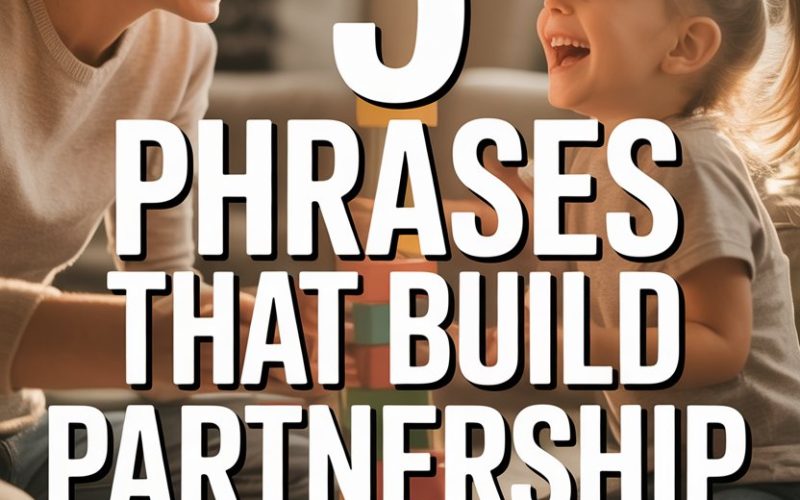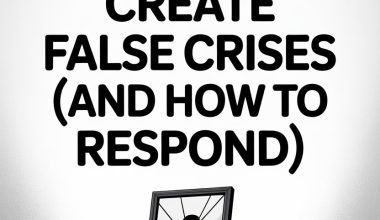If parenting came with a soundtrack, it would probably be a mashup of “Please put that down,” “Because I said so,” and the distant sound of something breaking.
Yet, raising kids isn’t just about managing chaos—it’s about building a bond where cooperation actually happens (sometimes without bribery).
Wishful thinking? Not really. The right words can transform the dynamic from constant power struggle to genuine teamwork.
Here are five phrases that foster partnership and mutual respect—even on days when you’re outnumbered, out-snacked, and out-of-your-mind.
1. What’s your plan?
Few things shut down a conversation faster than barking orders. Instead, hand over a little agency.
When you ask, “What’s your plan?”, you signal that your child’s ideas matter, even if their plan currently involves taping forks to their knees and becoming a robot.
Psychologists call this strategy “autonomy support,” and it’s been linked to higher motivation and better problem-solving in children. Put simply: kids are more likely to cooperate when they feel they have a say.
Picture this: your child is dawdling instead of getting ready for bed. Rather than issuing your eighth bedtime reminder of the hour, try, “You know what needs to happen before bed. What’s your plan to get ready?”
Not only does this open the door to creative solutions, but it also nudges your child toward independence.
And if the plan involves something truly bonkers, like brushing teeth while hanging upside down—well, as long as it’s safe and gets the job done, sometimes it’s worth letting them try.
2. Can we figure this out together?
Power struggles are about as much fun as stepping on Lego in bare feet. Shifting the vibe from “me vs. you” to “we’re in this together” can work wonders.
This phrase is an invitation. It tells your child, “Your input matters, and I’m willing to meet you halfway.”
Researchers have found collaborative problem-solving boosts kids’ emotional regulation and reduces conflict at home. Plus, you might be surprised by how reasonable children can be when given the chance.
Say your seven-year-old is sulking about screen time limits.
Instead of a flat “No more iPad,” try, “Can we figure this out together? I want you to enjoy your games, and I also want you to get enough sleep. What are some ideas?” Watch as your child transforms from “opponent” to “negotiator.”
Sure, you’ll sometimes land on solutions that look suspiciously like what you wanted all along. But giving kids a seat at the table makes them more likely to stick with the agreement.
3. I see you’re feeling…
Ever had someone shut down your feelings with a brisk “You’re fine”? Not exactly a trust-builder. Kids crave empathy (don’t we all?)—especially when big emotions bubble over.
Naming feelings does more than just show you care.
Daniel Siegel, author of The Whole-Brain Child, champions this approach, noting that when children hear their feelings acknowledged, their brains shift from emotional overload into problem-solving mode.
Try, “I see you’re feeling frustrated your tower fell after you spent so long building it.” This doesn’t mean you swoop in to fix or distract.
Sometimes, just sitting with the feeling is enough to help your child recover and reset.
Warning: You may get an eye roll or an emphatic “I’M NOT FRUSTRATED!” It’s still worth the effort.
Over time, this phrase teaches kids that emotions are manageable and that you’re the person who gets it—even when the world feels unfair.
4. I need your help
When was the last time someone genuinely asked for your help? Not assigned you a chore, not guilted you into it, but simply said, “I need your help.” Feels pretty good, right? Kids are no different.
Research shows children are more invested when they feel their contribution matters. Harvard’s Center on the Developing Child notes that shared responsibility builds confidence and connection.
Need the table set? “I need your help getting things ready for dinner.” Trouble with the morning routine? “I can’t get everyone out the door on time without your help.” Suddenly, you’re not the nag—it’s a team effort.
This phrase isn’t about manipulation. It’s about extending trust and showing kids that their actions make a real difference.
Even reluctant kids (yes, even the ones who act allergic to chores) are often more willing to pitch in when asked as a partner, not a subordinate.
5. What do you think we should do?
Curiosity is the secret sauce in any partnership. When you ask for your child’s perspective—even on small matters—you’re showing respect for their ideas and training their decision-making muscles.
You don’t have to agree with every suggestion. (No, we can’t have pizza for breakfast every day, but thanks for your thoughts.) The point is to let your child know their opinions matter.
Try this when you hit a snag: siblings fighting over the last blueberry muffin, or a standoff over weekend plans. “What do you think we should do?” invites creativity and compromise.
You might hear surprising wisdom: “What if we split it?” or “Maybe we can take turns choosing what to do.”
This phrase works wonders with older kids, too. When tweens and teens sense their voice counts, they’re more likely to keep talking—even about the tough stuff.
The Power of Partnership: Small Words, Big Impact
Parenting doesn’t come with a script, but these five phrases can make you sound like you’ve actually read the manual. Each one helps transform daily life from a series of standoffs into opportunities for teamwork.
Sure, some days you’ll still find yourself refereeing arguments about whose turn it is to feed the goldfish (again).
But with a bit of practice, these conversations lay the groundwork for respect, resilience, and a home where everyone feels heard.
Give one a try tonight. You might just catch your child—and yourself—leaning in.
And when that happens, dinner might even get to the table before someone starts a conga line with the dog.
Small words, big difference. Parenting gold, right there in your pocket.





